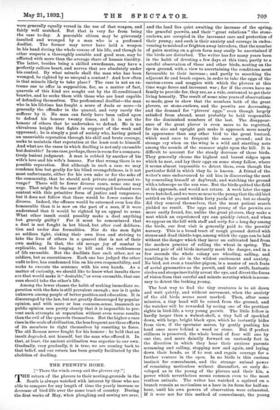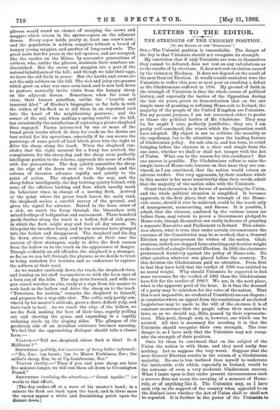THE PEEWIT'S HOME.
f " There the winds sweep and the plovers cry."]
THE return of the plovers to their nesting-grounds in the South is always watched with interest by those who are able to compare for any length of time the yearly increase or decrease of bird-life over the same tract of country. During the first weeks of May, when ploughing and sowing are over,
and the land lies quiet awaiting the increase of the spring, the graceful peewits, and their "great relations" the stone- curlews, are occupied in the incessant care and protection of their young; and such is their anxiety and courage in endea- vouring to mislead or frighten away intruders, that the number of pairs nesting on a given farm may easily be ascertained if the birds are disturbed. The writer has for many years been in the habit of devoting a few days at this time, partly to a careful observation of these and other birds, nesting on the open ground, with a view to ascertaining the conditions most favourable to their increase ; and partly to searching the adjacent fir and beech copses, in order to take the eggs of the carrion-crows and magpies with which the plovers at this time wage fierce and incessant war ; for if the crows have no family to provide for, they are, as a rule, contented to get their living honestly. The result of some nine years of observations so made, goes to show that the numbers both of the great plovers, or stone-curlews, and the peewits are decreasing, and the demand for "plovers' eggs," even though largely satisfied from abroad, must probably be held responsible for the diminished numbers of the last. The disappear- ance of the great plover is even more to be regretted, for its size and upright gait make it approach more nearly in appearance than any other bird to the great bustard, which used once to frequent the same ground ; and its strange cry when on the wing is a wild and startling note among the sounds of the summer night upon the hill. It is difficult to account for the steady decrease of these birds. They generally choose the highest and barest ridges upon which to nest, and lay their eggs on some stony fallow, where it seems almost impossible to detect them, even though the particular field in which they lie is known. A. friend of the writer's once endeavoured to aid him in discovering the nest by concealing himself at daybreak, and watching the ground with a telescope as the sun rose. But the birds quitted the field at his approach, and would not return. A week later the eggs were batched, and we were so near to the young that the old bird settled on the ground within forty yards of us ; but so closely did they conceal themselves, that the most patient search I yielded no result. The eggs and young of the peewits are more easily found, for, unlike the great plovers, they make a nest which an experienced eye can quickly detect, and when we appear on the hill with staff and scrip for a long day among the birds, our first visit is generally paid to the peewits' nursery. This is a broad tract of rough ground dotted with stones and dead thistle-tops, among which the eggs can be laid without the danger which they incur on cultivated land from the modern practice of rolling the wheat in spring. The nearest pair of old birds instantly mark the danger, and in a few seconds the whole colony are wheeling, calling, and tumbling in the air in the wildest excitement and anxiety. No bird, not even a tumbler-pigeon, is a master of such feats of aerial gymnastics as the peewit, and their swift, fantastic circles and stoops inevitably arrest the eye, and divert the focus of vision from that careful and minute scrutiny which is neces- sary to detect the lurking young.
The best way to find the tiny creatures is to sit down and wait quietly, and without movement, when the anxiety' of the old birds seems most marked. Then, after some minutes, a tiny head will be raised from the ground, and the watcher will be rewarded by seeing one of the prettiest sights in bird-life, a very young peewit. The little fellow is hardly larger than a walnut-shell, a tiny ball of speckled down, with large, bright black eyes, which he instantly hides from view, if the spectator moves, by gently pushing his head once more behind a weed or stone. But if perfect stillness is preserved, the whole brood of four will one by one rise, and move daintily forward on unsteady feet in the direction in which they hear their anxious parents screaming and calling, stopping now and again, and laying down their heads, as if to rest and regain courage for a further venture in the open. In no birds is this curious instinct for concealment, and the strange animal power of remaining motionless without discomfort, so early de- veloped as in the young of the plovers and their kin, a power which nevertheless seems common even to the most restless animals. The writer has watched a squirrel on a branch remain as motionless as a hare in its form for half-an- hour, until his own powers of observation were exhausted. If it were not for this method of concealment, the young plovers would stand no chance of escaping the crows and magpies which swarm in the spruce-copses on the adjacent downs. Every copse holds yearly at least one crow's nest; and the population is seldom complete without a brood of hungry young magpies, and another of long-eared owls. The great nests last for years in the tall spruces, and are occupied, like the castles on the Rhine, by successive generations of robbers, who, unlike the plovers, maintain their numbers un- diminished. But the crows and magpies are a part of the natural inhabitants of the hill; and though we take their eggs, we leave the old birds in peace. But the hawks and crows are not the only robbers on the hill. The rich and juicy rye-grasses which grow on what was once corn-land, and is now laid down to pasture, naturally invite visits from the hungry sheep on the adjacent downs. Sometimes, when the coast is clear, their human guardian, unlike the "humble and innocent Abel" of Hooker's biographer, so far falls in with the wishes of his flock as to aid them in an organised raid into the heart of the neighbouring pastures ; and the owner of the soil, when making a spring ramble on the hill, has occasionally the satisfaction of capturing a pirate-shepherd thus engaged. Farms intersected by one or more of the broad green tracks which do duty for roads on the downs are best suited for his operations, especially if he can secure the pasturage of some patch of land which gives him the right to drive his sheep along the track. When the shepherd con- cludes that the right moment for a foray has arrived, the conspirators, for the sheep-dog and the sheep seem perfectly intelligent parties to the scheme, approach the scene of action with due precautions. The dog quietly assembles the sheep on the edge of the down next to the high-road, and the column of invasion advance rapidly and quietly to the point of action. The shepherd leads the way, and the sheep follow intelligently, the dog trotting quietly behind, with none of the officious barking and fuss which usually mark its behaviour when in charge of a moving flock. Arrived at the point where the green track leaves the main road, the shepherd makes a careful survey of the ground, and gives the signal for advance. Buried in the loose straw of a rick, we watch the foray through the binoculars with mixed feelings of indignation and amusement. Three hundred yards further along the track is a hollow, full of rich grass, in which the flock might stay and feed all day unseen. To this point the invaders hurry, and in ten minutes have plunged into the hollow and disappeared. The shepherd and his dog lie down above them, and contemplate at their ease the success of their stratagem, ready to drive the flock unseen from the hollow on to the track on the appearance of danger. Though evidently an old offender, the shepherd is a stranger, so far as we can tell through the glasses ; so we decide to trust to being mistaken for tourists, and so endeavour to capture the robbers at their meal.
As we wander carelessly down the track, the shepherd rises, and leaning on his staff reconnoitres us with the keen eyes of a born son of the hills. The dog trots forward, and with one paw raised watches us also, ready at a sign from his master to rash back to the hollow and drive the sheep on to the track.
• Towerists, for zartain," remarks the shepherd to himself, and prepares for a way-side chat. The collie, only partly con- vinced by his master's attitude, gives a short, defiant yelp, and trots back to heel. As we reach the edge of the hollow, we see the flock making the best of their time, eagerly pulling out and chewing the grass, and expanding in a rapidly widening circle up the sloping sides. The glimpse of the predatory side of an Arcadian existence becomes amusing. We feel that the approaching dialogue should take a classic form :— VIATOR.—" Tell me, shepherd, whose flock is this? Is it idelibcens' ? "
SHEPHERD (politely, but conscious of being better informed). —"No, Zur; 'em beant ; 'era be Mister Porkinses, Zur; the miller's sheep, Zur, be at Up-Lambourne, Zur."
VIATOR (tartly).—" Then if you and your sheep are here five minutes longer, we will run them all down to Cressington Pound."
SHEPHERD (realising the situation).—" Great Apollo!" (or words to that effect).
[The dog rushes off at a wave of his master's hand ; in a minute the flock are back upon the track, and in three more the enemy appear a white and diminishing patch upon the distant down.]



































 Previous page
Previous page